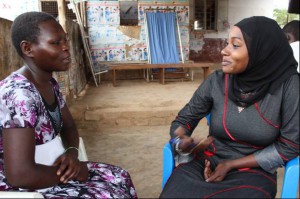The work done by our country offices in East Africa is fundamental to the success of DSW. Without it we would not be the organization we are today. Through this blog we will periodically bring you success stories and interesting dispatches from the work being done with youth groups and other partners.
The sexual health of adolescents is a growing global public health issue. In Uganda, 26.4 per cent of girls aged between 15 and 19 had begun bearing children. And one in every four teenage girls between 15 and 19 was found pregnant (UDHS 2011). The Ugandan department of health further notes that about 14 per cent of young women and 16 per cent of young men had their first sexual encounter before the age of 15 while 57 per cent of young women had their first encounter before the age of 18.
Young people begin sex early and yet only 11% of teenagers aged 15 to 19 years use family planning methods resulting in unwanted pregnancies and unsafe abortion. Peer-led sexual health education is one means of addressing deficiencies in adolescent sexual health.
In order to reach a large number of people, DSW trained peer educators from the 11 youth clubs members andthese pass on knowledge to their peers hence enhancing the multiplier effect. “We train the youth in reproductive health, pregnancy, HIV/AIDS, STIs and how to avoid getting STIs or infecting others. Those we train go back and train others as well in the community so that they don’t have to come to MUVUBUKA all the time,” noted Rebecca Sekitto, Trainer of Trainer and Counselor, MUVUBUKA AGUNJUSE.
This approach has impacted positively on the lives of very many young people.
“Before I came here, I never knew about adolescent health issues and was at risk of so many diseases like HIV/AIDS and STIs, but now I know about them and their mode of transmission. This has helped me to keep safe and avoid engaging in risky health behaviours,” said Hassan Ssali 24, one of the beneficiaries of the Y2Y project.
Adding, “The trainings have also made me more knowledge on sexual and reproductive health rights and understanding others and myself. I feel very much empowered and can make positive decisions.”
“Through the peer to peer counseling sessions, I learnt how to keep myself safe. I do not go around sleeping with men and when I do feel like have sex, I have it with my boyfriend who should always put on a condom,” said Ritah Naiga, Nabweru Youth Club.
The trainings and sessions have thus helped young people better appreciate themselves and confident in life.
“Because of the training I got in life planning skills, I understand myself better and others as well. I know how to cope with life in whatever situation I am in. I can live in a community where there a problems for instance alcohol and drug abuse, and adolescent pregnancywithout necessary being part of the problem or doing the same things just to fit in the community.”
And for the counselor and peer educators involved changing the lives of these young people, they are very proud of their contribution thus far.
“It feels good to be of service to the young people and helping them solve some of their sexual and reproductive health problems,” said Fatumah Abbasi, counselor, Kitebi Youth Club.
Want to know more about DSW’s pioneering Youth-to-Youth project? Check out our website for more information on how these youth groups are improving the lives of young men and women every day in East Africa.



